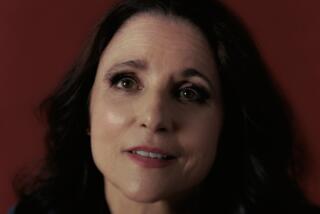Television review: Carrie Fisher’s ‘Wishful Drinking’
- Share via
Carrie Fisher played Princess Leia Organa in the first three “Star Wars” movies. You know it, and she knows it, and she knows you know it, and that will bind you as long as you both shall live. Possibly you also know that she is the daughter of the actress Debbie Reynolds, and less probably you may know that she is the daughter of the singer Eddie Fisher, because you are less likely to know who Eddie Fisher was, as much of a pop star as he was in his day.
“If my life wasn’t funny it would just be true — and that is completely unacceptable,” Fisher says near the top of “Wishful Drinking,” a taped performance of her still-touring one-woman show (also adapted to a book), which comes Sunday to HBO. Show business warped her life from her first breath, as she tells it, with doctors and nurses so bedazzled by her famous folks that “when I arrived I was virtually unattended. And I’ve been trying to make up for that fact ever since — even this show tonight is a pathetic bid for the attention that I lacked as a newborn.” (Her father, who died in September, was still alive and in the present tense when the show was taped.)
Title aside, beyond an opening (“Hi, I’m Carrie Fisher and I’m an alcoholic”) and a few stray nods (“You know how they say that religion is the opiate of the masses? Well, I took masses of opiates religiously”), this is not a memoir of substance abuse. Fisher’s main subjects are her parents (living in individual clouds of pixie dust), her own relationships (marriage to Paul Simon, parenthood with a talent agent who left her for another man), her mental health (she suffers from bipolar disorder) and, inescapably, “Star Wars” and all that it has given to and asked of her.
“My stunning layered nuanced performance,” Fisher says here of Leia, in the ironic voice she favors. That likeness has been molded to, among many other things, a Pez dispenser, “a shampoo where you could twist off my head and pour liquid out of my neck” and a (presumably unauthorized) sex doll, and it follows her to this day:
“She used to be hot, now she looks like Elton John,” she reads of herself, and recalling the figure she memorably cut in “Return of the Jedi,” observes, “I did not realize that when I donned that ... metal bikini back when I was 23 that I had made an invisible contract to stay looking the exact same way for the next 30 to 40 years. Well, obviously, I’ve betrayed the contract.”
Brief interpolated film clips — including home movies of a teenage Fisher as a drama student in London (“the only unexamined time of my life”) and an interview in which describes her hallucinations to Diane Sawyer — help fill out her earlier selves. With her delivery pitched to the back of a theater, Fisher can be broad, but that is also the person she plays everywhere now: a little larger than life, worn but not worn out. She’s funny as an actress, and as a writer makes memorable phrases: “The secret handshake of shared sensibility” (to describe her connection to Simon); “Things were getting worse faster than we could lower our standards” (of its deterioration); “Celebrity is just obscurity biding its time.”
This is not one of those emotional journeys in which the teller comes finally to forgive herself and the world and we get out our handkerchiefs. Craziness is Fisher’s baseline — “Wishful Drinking” begins and ends before the image of a padded cell — and clarity the thing she buys with comedy. Life will kill you, she seems to say: You might as well laugh.
More to Read
The complete guide to home viewing
Get Screen Gab for everything about the TV shows and streaming movies everyone’s talking about.
You may occasionally receive promotional content from the Los Angeles Times.







